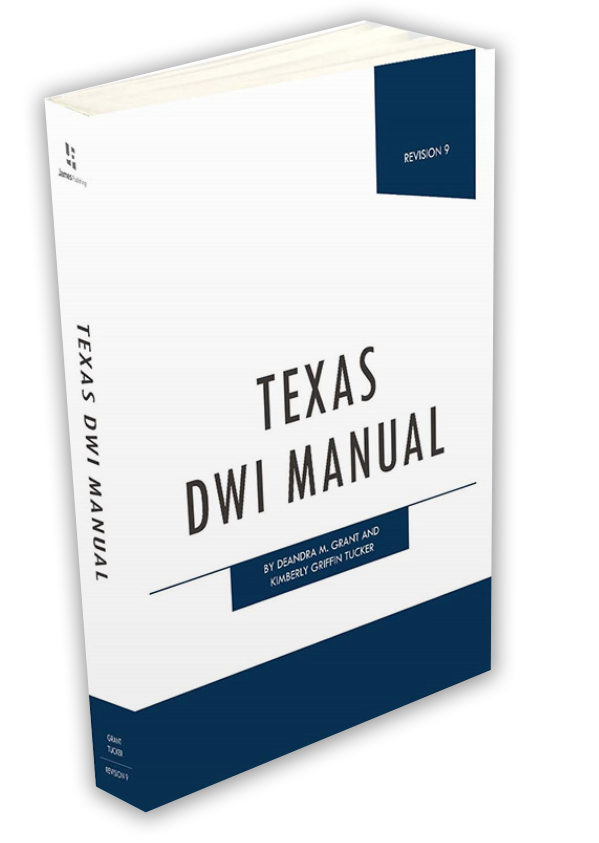Do You Need Legal Help?

"Deandra Grant Law fights hard for their clients and is always willing to go above and beyond. They are the best firm for DWI cases in DFW and beyond. Definitely hire them to represent you in any pending cases."
- P. Williams

"Deandra Grant made a tough situation so much better. She listened to my concerns and helped me so much with my case. I would recommend her to anyone needing legal services."
- M. Haley

"Deandra Grant Law handled my case with diligence and professionalism. Deandra Grant's reputation is stellar and now I know why. She has a team of individuals who provide quality service."
- N. Coulter
As Seen On





A Fighting Team On Your Side
Since 1994 when our doors opened, Deandra Grant Law has helped thousands of clients get their DWI charges reduced or dismissed. We're ready to fight on your behalf.

Managing Partner
Partner & Criminal Division Chief
Criminal Division Senior Associate
Criminal Division DWI Trial Chief
Immigration Division Chief & Criminal Division Deputy Chief
Criminal Division Associate

Texas DWI Manual
By Attorney Deandra Grant
Fighting DWI charges can present many challenges, not only for the defense, but prosecutors as well. This is why it is important to be armed with the necessary knowledge so you understand the DWI process.
Attorney Deandra M. Grant is the co-author of the Texas DWI Manual, offering legal advice to both clients and fellow attorneys. Fighting DWI charges can present may challenges, not only for the defense, but prosecutors as well. This is why it is important to be armed with the necessary knowledge so that you understand the DWI criminal process.
Learn MoreTexas DUID Lawyers
The Complex World of Driving under the influence of drugs Charges in Texas
A driving under the influence of drugs charge in Texas is not to be taken lightly. The legal system can be complex, and the consequences of a conviction can be life-altering. Texas has strict laws regarding driving while intoxicated (DWI) by drugs, and the penalties can range from fines to license suspension, mandatory classes, and even jail time.
Understanding the Charges: Texas DUID Lawyers Can Help
When it comes to Driving under the influence of drugs charges in Texas, there are several key points to understand. It’s important to remember that being charged with a Driving under the influence of drugs offense does not automatically mean you’re guilty. The legal process allows for a thorough examination of the evidence, the circumstances of your arrest, and the methods used by law enforcement.
Texas Driving Under the Influence of Drugs Information
You can be arrested and charged for DWI if your driving has been impaired by any of the following:
- Prescription drugs—such as Xanax, Valium, Vicodin, Ambien, Soma, and Alprazolam—whether you have a valid prescription from a doctor or not
Illegal drugs, such as marijuana, cocaine, heroin, LSD, methamphetamine, or others - Over-the-counter drugs, such as cold medicines, allergy medicines, sleep aids, and cough medicines
- Any substance that causes dizziness, drowsiness, sleepiness, or impairs your motor skills, judgment, or reaction time may bring on a DWI arrest
You could be facing potential jail time, hefty fines, probation, the loss of your license, other court-ordered sanctions and programs, and a permanent criminal record upon conviction. State prosecutors pursue DWI charges aggressively in their goal of serving the public interest. That is why you need the skills and services of the team at Deandra Grant Law who can combat your charges with an aggressive and skilled defense.
Here are some crucial aspects to consider:
Types of Drugs: The term “drugs” in a DWI context can refer to illegal substances, prescription medications, or over-the-counter drugs. Our experienced Texas DUID Lawyers are well-versed in identifying the nuances and building effective defense strategies tailored to your specific situation.
Evidence Matters: From the initial traffic stop to the field sobriety tests and chemical tests, there’s a lot of room for errors and misinterpretation. Our legal team is skilled at analyzing the evidence to identify any potential weaknesses in the prosecution’s case.
Your Rights: It’s important to remember that you have rights, even when facing a Driving under the influence of drugs charge. Law enforcement must follow proper procedures during the arrest and testing process. Any violations of your rights could lead to the reduction or dismissal of charges.
Why Choose Deandra Grant Law?
At Deandra Grant Law, we are dedicated to providing top-tier legal representation for those facing Driving under the influence of drugs charges in Texas. Here’s why we’re the right choice for you:
Expertise: Our legal team, led by the experienced Deandra Grant, specializes in DWI defense. With years of experience, we have a deep understanding of Texas DWI laws, legal procedures, and effective defense strategies.
Personalized Approach: We recognize that each case is unique. Our Texas DUID Lawyers take the time to listen to your side of the story, gather evidence, and develop a defense strategy tailored to your situation.
Track Record: Our results speak for themselves. We have a proven track record of securing favorable outcomes for our clients, whether through reduced charges, dismissals, or acquittals.
How Deandra Grant Law Can Help
If you find yourself facing the daunting reality of a driving under the influence of drugs arrest in Texas, you’re likely feeling overwhelmed and concerned about what the future holds. Navigating the legal system on your own can be an uphill battle, especially when the stakes are high. That’s where having an experienced team of Texas DUID Lawyers on your side can make all the difference.
Why Experience Matters
When it comes to defending against driving under the influence of drugs charges, experience truly matters. Deandra Grant Law boasts a team of seasoned professionals who have dedicated their careers to mastering the intricacies of DWI defense. With years of collective experience in Texas courts, we’ve built a reputation for our skillful strategies and track record of success.
Understanding the Gravity of Driving under the Influence of Drugs Convictions
A conviction for driving under the influence of drugs can lead to severe consequences that extend beyond just the legal penalties. Fines, jail time, a permanent criminal record, and a suspended driver’s license are all potential outcomes that can impact your life in substantial ways. The complexities of court and administrative proceedings can be overwhelming, and that’s precisely where our expertise comes in.
Guidance Through Every Step
At Deandra Grant Law, we believe that every client’s case is unique and deserves personalized attention. From the moment you reach out to us, we offer a free consultation to discuss the specifics of your situation. During this crucial phase, we take the time to understand your concerns, gather information, and provide an initial assessment of your case.
Mapping Out Your Defense Strategy
Armed with the details of your case, our Texas DUID Lawyers will begin crafting a tailored defense strategy. We’ll analyze the evidence, scrutinize the procedures followed during your arrest, and identify any potential flaws in the prosecution’s case. Our goal is to determine the most effective approach to maximize your chances of a successful outcome.
Your Best Chance for a Successful Outcome
Choosing Deandra Grant Law as your legal representation can significantly impact the trajectory of your case. Our team’s expertise in driving under the influence of drugs defense, combined with our dedication to your best interests, sets us apart as a reliable ally during this challenging time. We understand that facing legal proceedings can be daunting, and we’re here to guide you through every step of the way.
Empowering You with Knowledge
One of our core values at Deandra Grant Law is to empower our clients with knowledge. We believe that an informed client is better equipped to make crucial decisions about their case. We’ll explain the legal process in understandable terms, answer your questions, and ensure you’re always aware of your options and potential outcomes.
Related Blogs
Navigating the Path Ahead: Avoiding Mistakes After a Driving Under the Influence of Drugs Arrest in Texas
Finding yourself facing a driving under the influence of drugs arrest in Texas, can be an unsettling experience. It’s natural to feel a mix of confusion and concern about what comes next. The decisions you make during this critical time can greatly impact the outcome of your case. To help you navigate the path ahead, we’ve compiled a list of common mistakes to avoid – and how Deandra Grant Law can provide the guidance you need.
Mistake 1: Waiting to Seek Legal Help
Time is of the essence after a driving under the influence of drugs arrest. Waiting too long to seek legal representation can lead to missed opportunities for building a strong defense. The sooner you reach out to Deandra Grant Law, the sooner we can begin assessing your case, preserving evidence, and crafting an effective defense strategy.
Mistake 2: Providing Incriminating Statements
It’s natural to want to explain your side of the story to law enforcement, but it’s important to remember that anything you say can be used against you. Providing statements without the guidance of legal counsel can inadvertently provide evidence that could weaken your defense. Our experienced Texas DUID Lawyers can help you navigate interactions with law enforcement to protect your rights.
Mistake 3: Believing There’s No Defense
Some individuals facing driving under the influence of drugs charges assume that the evidence against them is insurmountable. However, even in challenging cases, there may be legal avenues to explore. Deandra Grant Law specializes in developing innovative defense strategies tailored to your unique circumstances. Our extensive experience can uncover weaknesses in the prosecution’s case that you might not have considered.
Mistake 4: Underestimating the Consequences
A driving under the influence of drugs conviction can have lasting repercussions beyond just legal penalties. A criminal record, fines, jail time, and a suspended driver’s license are all potential outcomes that can affect your life for years to come. Deandra Grant Law understands the gravity of these consequences and will work tirelessly to minimize their impact on your future.
Frequently Asked Questions: Your Driving Under the Influence of Drugs Arrest in Texas
Being arrested for driving under the influence of drugs in Texas, can lead to a barrage of questions and concerns about what lies ahead. At Deandra Grant Law, we’re here to provide you with the answers you need to navigate through this challenging time. Below, we’ve compiled a list of frequently asked questions along with our expert answers to help you gain clarity and make informed decisions.
If you’ve been arrested, remember that you have the right to remain silent. It’s generally advisable to provide only basic information, such as your name and identification. Avoid making incriminating statements or answering questions without the presence of legal counsel.
Yes, it’s possible. Having a prescription for the medication does not automatically protect you from driving under the influence of drugs charges. However, if you were taking the medication as prescribed and were not impaired, we can help build a defense to show that your driving was not affected by the medication.
A driving under the influence of drugs conviction can lead to fines, probation, mandatory drug education programs, a criminal record, and even jail time. Additionally, your driver’s license may be suspended, making it challenging to commute and maintain your daily life.
Your driver’s license may be suspended after a driving under the influence of drugs arrest. However, you have the right to request an administrative hearing to contest the suspension. Our Texas DUID Lawyers can guide you through this process and work to protect your driving privileges.
Refusing a drug test during a traffic stop can have consequences, including automatic license suspension. However, the procedures for administering these tests must be followed correctly. If they were not, we can challenge the validity of the test results.
Our experienced Texas DUID Lawyers can provide you with a personalized defense strategy. We’ll analyze the evidence, scrutinize procedures, and identify potential weaknesses in the prosecution’s case. Our goal is to guide you through the legal process and pursue a positive outcome for your situation.
We understand that finances can be a concern. We offer free consultations to discuss the specifics of your case and provide an initial assessment. During this consultation, we’ll also discuss the costs involved and work to provide a clear understanding of our fee structure.
Scheduling a free consultation is easy. You can reach out to us through our website, give us a call, or send us an email. We’ll respond promptly and arrange a time that works for you to discuss your case.
Driving Under the Influence of Drugs Defense Client Story
This client story is for educational purposes only.
In the heart of Texas, where the bustling city lights meet the shadows of uncertainty, lived a woman named Caroline. She had always been cautious, someone who followed the rules and made decisions with care. But one fateful night, everything changed. Caroline found herself in a situation she could never have imagined – arrested for driving under the influence of drugs.
The weight of the charges pressed down on her, causing sleepless nights and endless worry. She felt lost in a maze of legal jargon and complex procedures. Her future seemed to hang in the balance, and the fear of the unknown gripped her heart.
In her search for guidance, Caroline came across Deandra Grant Law, a beacon of hope in her darkest hour. Among the team of legal professionals, there was one who stood out – attorney Douglas Huff. From their very first meeting, Caroline sensed that she had found someone who would not only fight for her rights but also understand her story.
Douglas listened as Caroline poured out her fears, anxieties, and doubts. With a reassuring smile, he explained the legal process in simple terms, making sure she understood every step of the journey ahead. His empathy and genuine concern put her at ease, giving her the strength to face the challenges that lay ahead.
As the legal battle began, Douglas tirelessly examined every piece of evidence, leaving no stone unturned. He understood that Caroline’s case was unique, and he tailored his approach accordingly. With his expertise, he pieced together a defense strategy that highlighted inconsistencies and raised questions about the validity of the charges.
Through it all, Douglas remained a steadfast guide, always ready to answer Caroline’s questions, no matter how big or small. He never treated her as just another case; instead, he made her feel like a partner in her own defense. With each meeting, he provided her with the knowledge she needed to make informed decisions about her future.
And then came the moment of truth – the trial. As Caroline sat in the courtroom, her heart raced with anticipation. But by her side was Douglas, the embodiment of unwavering support. His meticulous cross-examinations and compelling arguments painted a picture that shattered the prosecution’s case. Caroline watched as doubt crept into the eyes of the jury.
And then, the moment she had been hoping for arrived – the verdict. Not guilty. The words echoed through the courtroom, and Caroline’s eyes filled with tears of relief. In that moment, she knew that with the guidance of Deandra Grant Law and the dedication of Douglas Huff, justice had been served.
Contact Our Texas DUID Lawyers Today for Your Free Consultation
Facing a driving under the influence of drugs arrest in Texas, can be an overwhelming experience, but you don’t have to face it alone. Deandra Grant Law is here to provide you with the expert legal representation you need to navigate through this challenging time.
Our team of experienced Texas DUID Lawyers is dedicated to helping you achieve a positive outcome for your case. We understand the complexities of friving under the influence of drugs charges and the impact they can have on your future. That’s why we offer free consultations to discuss the specifics of your situation and provide initial insights into your case.
Client Reviews
![]()
“Deandra Grant Law handled my case with diligence and professionalism. Deandra Grant’s reputation is stellar and now I know why. She has a team of individuals who provide quality service.”














